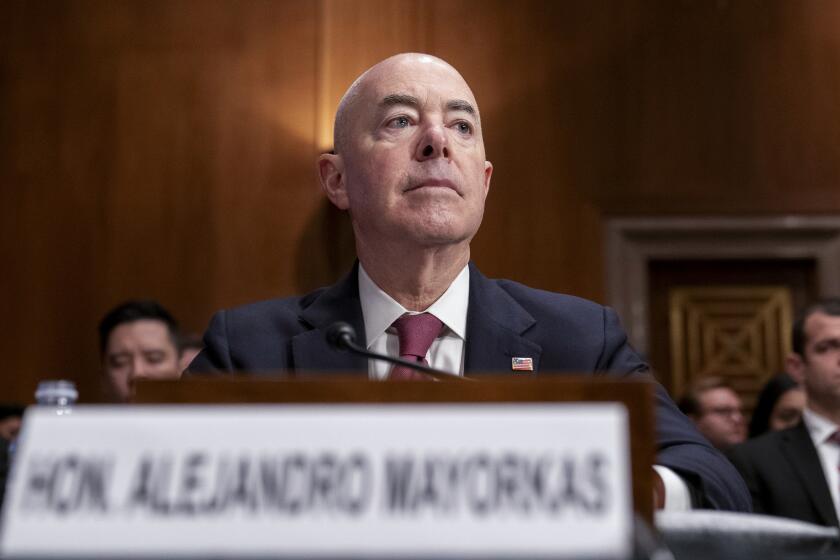House Republicans send Mayorkas impeachment articles to the Senate, forcing trial

WASHINGTON — The House sent two articles of impeachment against Homeland Security Secretary Alejandro N. Mayorkas to the Senate on Tuesday, forcing a trial on allegations that he has “willfully and systematically” refused to enforce immigration laws.
While the Senate is obligated to hold a trial under the rules of impeachment once the charges are walked across the Capitol, the proceedings may not last long. Democrats are expected to try to dismiss or table the charges later this week before the full arguments get underway.
After delivering the articles, the Republican prosecutors appointed by House Speaker Mike Johnson (R-La.) stood in the well of the Senate. The Senate sergeant at arms, the chamber’s top security official, called the session to order with a “Hear ye! Hear ye!” and a notice that “all persons are commanded to keep silence, on pain of imprisonment.”
The House Homeland Security Committee chairman, Mark Green, a Tennessee Republican who is one of the impeachment managers, read the articles aloud as most senators sat in their seats, following along with their own paper copies.
The House has voted to impeach Homeland Security Secretary Alejandro N. Mayorkas over the Biden administration’s handling of the U.S.-Mexico border.
Republicans have argued that there should be a full trial. As Johnson signed the articles Monday in preparation for sending them across the Capitol, he said Senate Majority Leader Charles E. Schumer should convene a trial to “hold those who engineered this crisis to full account.”
Schumer (D-N.Y.) “is the only impediment to delivering accountability for the American people,” Johnson said. “Pursuant to the Constitution, the House demands a trial.”
After Tuesday’s ceremonial procession and presentation of the articles, the proceedings will not begin until Wednesday. Senators will be sworn in as jurors, turning the chamber into the court of impeachment. The Senate will then issue a summons to Mayorkas to inform him of the charges and ask for a written answer. He will not have to appear.
The entire process could be done within hours on Wednesday. Majority Democrats have said the GOP case against Mayorkas doesn’t rise to the “high crimes and misdemeanors” laid out as a bar for impeachment in the Constitution, and Schumer probably has enough votes to end the trial immediately if he decides to do so.
Schumer has said he wants to “address this issue as expeditiously as possible.”
House Republicans have released two articles of impeachment against Homeland Security Secretary Alejandro Mayorkas.
“Impeachment should never be used to settle a policy disagreement,” Schumer said. “That would set a horrible precedent for the Congress.”
The House narrowly voted in February to impeach Mayorkas for his handling of the U.S.-Mexico border. House Republicans charged in two articles of impeachment that Mayorkas has not only refused to enforce existing law but also breached the public trust by lying to Congress and saying the border was secure. It was the first time in nearly 150 years a Cabinet secretary was impeached.
Since then, Johnson has delayed sending the articles to the Senate for weeks while both chambers finished work on government funding legislation and took a two-week recess. Johnson had said he would send them to the Senate last week, but he delayed again after Senate Republicans said they wanted more time to prepare.
South Dakota Sen. John Thune, the Senate’s No. 2 Republican, has said the Senate needs to hold a full trial at which it can examine the evidence against Mayorkas and come to a conclusion.
“This is an absolute debacle at the southern border,” Thune said. “It is a national security crisis. There needs to be accountability.”
House impeachment managers previewed some of their arguments at a hearing with Mayorkas on Tuesday morning on President Biden’s budget request for the department.
House Speaker Mike Johnson will send articles of impeachment against Homeland Security Secretary Alejandro Mayorkas to the Senate after Congress returns.
Green, the chairman of the House Homeland Security panel, told the secretary that he has a duty under the law to control and guard U.S. borders, and “during your three years as secretary, you have failed to fulfill this oath. You have refused to comply with the laws passed by Congress, and you have breached the public trust.”
Mayorkas defended the department’s efforts but said the nation’s immigration system is “fundamentally broken, and only Congress can fix it.”
Other impeachment managers are Michael McCaul of Texas, Andy Biggs of Arizona, Ben Cline of Virginia, Andrew R. Garbarino of New York, Michael Guest of Mississippi, Harriet Hageman of Wyoming, Clay Higgins of Louisiana, Laurel Lee of Florida, August Plfuger of Texas and Marjorie Taylor Greene of Georgia.
At a news conference with a group of Republican senators after the articles were delivered, the impeachment managers demanded that Schumer move forward with their case.
“The voice of the people is very clear,” said McCaul, chairman of the House Foreign Affairs Committee. “Secure the border and impeach this man, this criminal.”
Exactly how Democrats will proceed on Wednesday is unclear. Impeachment rules generally allow the Senate majority to decide how to manage the trial, and Schumer has not said exactly what he will do.
The Republican-controlled House has impeached Homeland Security Secretary Alejandro Mayorkas over the Biden administration’s handling of the U.S.-Mexico border
After the jurors are sworn in, Senate Republicans are likely to try to raise a series of objections if Schumer calls a vote to dismiss or table. But ultimately they cannot block a dismissal if majority Democrats have the votes.
Some Republicans have said they would like time to debate whether Mayorkas should be impeached, even though debate time is usually not included in impeachment proceedings. Negotiations were underway between the two parties over whether Schumer may allow that time and give senators in both parties a chance to discuss the impeachment before it is dismissed.
While most Republicans oppose quick dismissal, some have hinted they could vote with Democrats.
Sen. Mitt Romney (R-Utah) said last week he wasn’t sure what he would do if there were a move to dismiss the trial. “I think it’s virtually certain that there will not be the conviction of someone when the constitutional test has not been met,” he said.
At the same time, Romney said he wants to at least express his view that “Mayorkas has done a terrible job, but he’s following the direction of the president and has not met the constitutional test of a high crime or misdemeanor.”
In any case, Republicans would not be able to win the support of the two-thirds of the Senate that is needed to convict and remove Mayorkas from office. Democrats control the Senate, 51 to 49, and they appear to be united against the impeachment effort. Not one House Democrat supported it, either.
In a dramatic setback, House Republicans fail to impeach Homeland Security Secretary Alejandro Mayorkas after a few GOP lawmakers refused to go along.
Sen. Sherrod Brown, a Democrat who is facing a tough reelection bid in Ohio, called the impeachment trial a “distraction,” arguing that Republicans should instead support a bipartisan border compromise they scuttled earlier this year.
If Democrats are unable to dismiss or table the articles, they could follow the precedent of several impeachment trials for federal judges over the last century and hold a vote to create a trial committee that would investigate the charges. While there is sufficient precedent for this approach, Democrats may prefer to end the process completely, especially in a presidential election year when immigration and border security are top issues.
If the Senate were to proceed to an impeachment trial, it would be the third in five years. Democrats impeached President Trump twice, once over his dealings with Ukraine and a second time in the days after the Jan. 6, 2021, attack on the Capitol. Trump was acquitted by the Senate both times.
At a trial, senators would be forced to sit in their seats for the duration while the House impeachment managers and lawyers representing Mayorkas make their cases. The Senate is allowed to call witnesses, as well, if it so decides, and it can ask questions of both sides after the opening arguments are finished. A full trial could potentially last weeks.
Jalonick and Groves write for the Associated Press . AP writer Farnoush Amiri contributed to this report.















